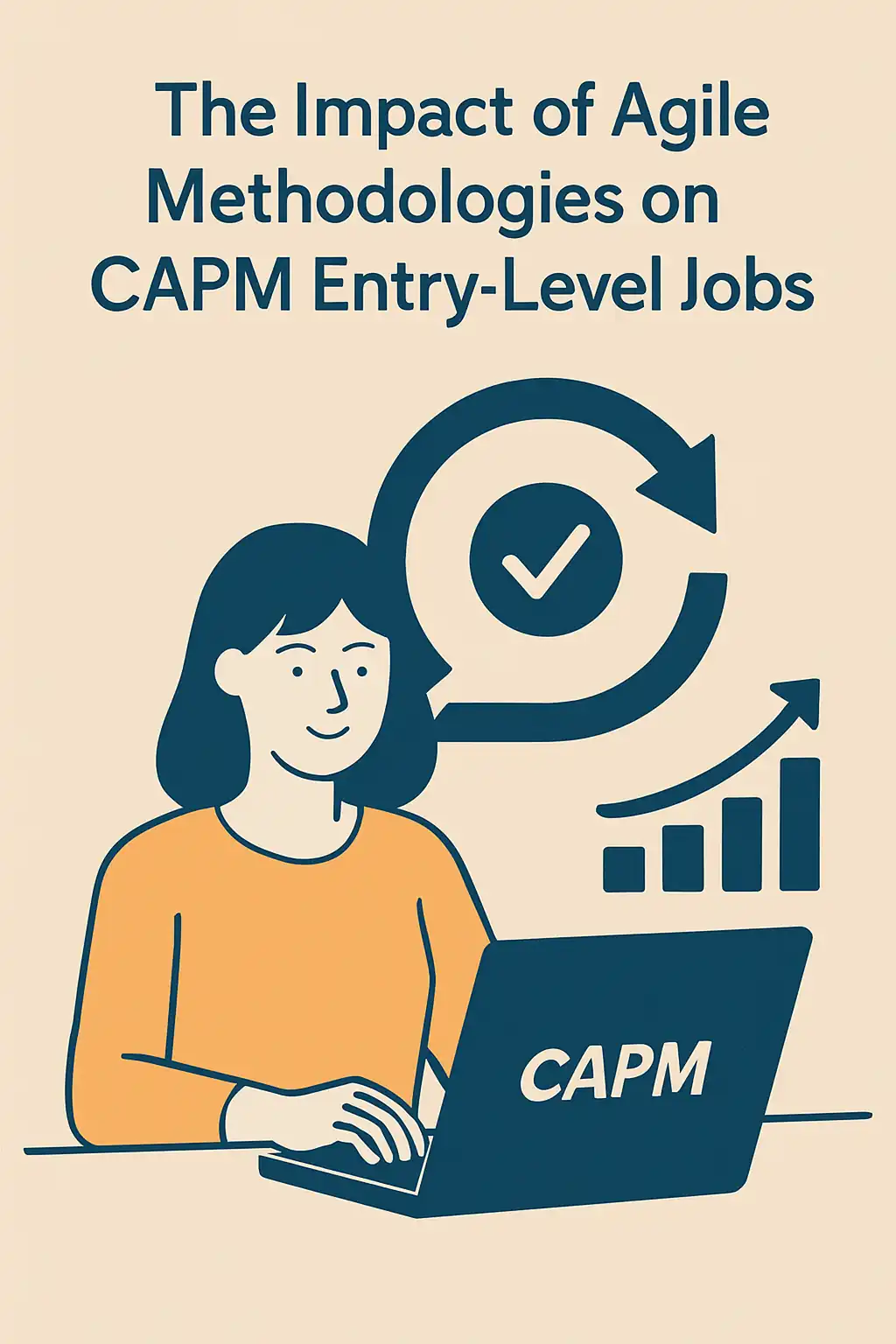Introduction
The Certified Associate in Project Management (CAPM) certification has emerged as a vital stepping stone for aspiring project managers. This entry-level credential, offered by the Project Management Institute (PMI), validates an individual’s understanding of fundamental project management principles and practices. It serves as a gateway for those looking to establish a career in project management, providing a solid foundation in both traditional and Agile methodologies [10][12].
As organizations increasingly adopt Agile methodologies to enhance their project delivery processes, the demand for professionals equipped with Agile skills has surged. Agile frameworks, such as Scrum and Kanban, emphasize collaboration, flexibility, and iterative progress, making them particularly effective in dynamic environments like software development [2][6]. The integration of Agile practices into project management not only improves efficiency but also aligns project outcomes more closely with customer needs, which is crucial in today’s fast-paced market [5][9].
This blog aims to explore the impact of Agile skills on entry-level CAPM job opportunities. By understanding the significance of Agile methodologies in the project management field, aspiring project managers can better position themselves in a competitive job market. As they embark on their careers, those with a strong grasp of Agile principles will likely find themselves in higher demand, opening doors to various roles such as project coordinators, junior project managers, and beyond [14][15]. The relevance of Agile skills in entry-level positions cannot be overstated, as they not only enhance employability but also prepare individuals for future advancements in their project management careers.
Understanding CAPM Certification
The Certified Associate in Project Management (CAPM) certification is a valuable credential for individuals aspiring to enter the field of project management. It is specifically designed to prepare candidates for entry-level project management positions, providing them with a foundational understanding of project management principles and practices.
Definition and Purpose of CAPM Certification
CAPM certification is administered by the Project Management Institute (PMI), a leading organization in the field of project management. The primary purpose of this certification is to demonstrate an individual’s competency in project management fundamentals, making it an essential stepping stone for those looking to establish a career in this domain. By obtaining the CAPM, candidates signal their commitment to project management excellence and their readiness to contribute effectively to project teams [1][15].
Eligibility Criteria and Examination Process
To be eligible for the CAPM certification, candidates must meet specific educational and experience requirements. Generally, applicants need to have a secondary degree (high school diploma or equivalent) along with 23 hours of project management education completed before taking the exam. The examination itself consists of 150 multiple-choice questions, which assess the candidate’s understanding of project management concepts, including agile methodologies, risk management, and stakeholder engagement [12][15].
Benefits of Obtaining CAPM Certification for Entry-Level Job Seekers
For those seeking entry-level positions in project management, obtaining the CAPM certification offers several advantages:
- Validation of Skills: The certification validates a candidate’s basic understanding of project management principles, which is crucial for roles such as project coordinator or assistant [7][13].
- Increased Job Opportunities: Many employers prefer or require candidates to have the CAPM certification, as it demonstrates a commitment to the profession and a foundational knowledge of project management practices [5][14].
- Career Advancement: While the CAPM is an entry-level certification, it can serve as a stepping stone for further career development. With experience and ongoing education, CAPM holders can progress to more senior project management roles, including the Project Management Professional (PMP) certification [8][13].
What are Agile Methodologies?
Agile methodologies represent a transformative approach to project management, particularly in software development. They emphasize flexibility, collaboration, and customer satisfaction, allowing teams to adapt to changing requirements and deliver value incrementally. Here’s a closer look at Agile methodologies, their core principles, and how they compare to traditional project management approaches.
Definition of Agile Methodologies and Their Core Principles
Agile is an iterative approach to project management that focuses on delivering value to customers more efficiently and effectively. It encourages teams to break down large projects into manageable tasks, facilitating a more responsive and adaptive workflow. The Agile Manifesto outlines four key values and twelve principles that guide Agile practices:
- Individuals and interactions over processes and tools
- Working software over comprehensive documentation
- Customer collaboration over contract negotiation
- Responding to change over following a plan
These principles promote a culture of continuous improvement and adaptability, which is essential in today’s fast-paced business environment [1][2].
Overview of Popular Agile Frameworks
Several frameworks embody Agile principles, each with its unique approach to project management:
- Scrum: This framework is designed for teams to work collaboratively in short cycles called sprints, typically lasting two to four weeks. Scrum emphasizes roles such as the Scrum Master and Product Owner, and includes ceremonies like daily stand-ups and sprint reviews to ensure continuous feedback and improvement [1][6].
- Kanban: Kanban focuses on visualizing work in progress and managing flow. It uses a board to represent tasks and their statuses, allowing teams to identify bottlenecks and optimize their processes. This framework is particularly effective for teams that require flexibility and continuous delivery [1].
- Lean: Lean methodology aims to maximize value by minimizing waste. It encourages teams to streamline processes and focus on delivering only what is necessary to meet customer needs. Lean principles can be applied in various industries, not just software development [1][10].
Comparison of Agile with Traditional Project Management Methodologies
Agile methodologies differ significantly from traditional project management approaches, such as Waterfall. Here are some key distinctions:
- Flexibility vs. Rigidity: Agile is inherently flexible, allowing teams to adapt to changes in requirements and priorities. In contrast, traditional methodologies often follow a linear and sequential process, making it challenging to accommodate changes once the project is underway [1][9].
- Incremental Delivery vs. Big Bang: Agile promotes incremental delivery of products, enabling teams to release functional components regularly. Traditional methods typically involve delivering the entire project at once, which can lead to longer timelines and increased risk if changes are needed late in the process [1][4].
- Collaboration vs. Hierarchical Structure: Agile emphasizes collaboration among team members and stakeholders, fostering a culture of open communication and feedback. Traditional project management often relies on a more hierarchical structure, where decisions are made at the top and communicated downwards [1][14].
The Demand for Agile Skills in Project Management
The integration of Agile methodologies has become a significant trend, particularly for entry-level roles such as those requiring the Certified Associate in Project Management (CAPM) certification. This section delves into the current job market, highlighting the increasing demand for Agile skills among aspiring project managers.
Statistics on Job Postings Requiring Agile Skills for CAPM Roles
The job market for project management professionals is robust, with the U.S. Bureau of Labor Statistics projecting a demand for approximately 1.1 million new project management jobs by 2027. A notable portion of these roles specifically seeks candidates with Agile skills. For instance, many job postings for entry-level project management positions now list Agile methodologies as a preferred or required skill. This trend underscores the importance of Agile knowledge for those entering the field, as organizations increasingly prioritize candidates who can adapt to Agile frameworks like Scrum, Kanban, and Lean [8][10].
Trends in Project Management Towards Agile Practices
The shift towards Agile practices is not merely a passing trend; it reflects a broader transformation in how projects are managed across various industries. Agile methodologies, once primarily associated with software development, are now being adopted in diverse sectors, including marketing, finance, and healthcare. This widespread adoption is driven by the need for flexibility, faster delivery times, and improved collaboration among teams. As a result, project managers who are well-versed in Agile principles are becoming increasingly valuable assets to organizations [3][11].
Case Studies or Examples of Organizations Adopting Agile Methodologies
Several organizations have successfully implemented Agile methodologies, showcasing the tangible benefits of this approach. For example:
- Spotify: The music streaming giant employs Agile practices to enhance team collaboration and accelerate product development. By organizing teams into small, cross-functional units known as “squads,” Spotify has improved its ability to respond to market changes and customer feedback quickly.
- ING: The Dutch bank has adopted Agile practices to streamline its operations and improve customer service. By restructuring its teams to work in Agile sprints, ING has seen significant improvements in project delivery times and employee engagement.
These examples illustrate how organizations that embrace Agile methodologies not only enhance their operational efficiency but also create a demand for project managers who can navigate and lead within this framework [10][11].
How Agile Skills Enhance CAPM Job Prospects
The demand for Agile skills has surged, particularly for those entering the field with a Certified Associate in Project Management (CAPM) certification. Understanding and applying Agile methodologies can significantly enhance employability for aspiring project managers. Here’s how:
Skills Gained from Agile Methodologies:
- Adaptability: Agile methodologies emphasize flexibility and responsiveness to change, which are crucial in today’s fast-paced work environments. Project managers who can adapt to shifting priorities are highly valued by employers [1].
- Collaboration: Agile promotes teamwork through regular communication and collaboration among team members. This skill is essential for managing diverse teams and ensuring project success [2].
- Problem-Solving: Agile practices encourage iterative problem-solving and continuous improvement, equipping project managers with the ability to address challenges effectively as they arise [3].
Real-World Applications of Agile Skills:
- Sprint Planning and Reviews: Entry-level project managers can apply Agile skills in organizing and facilitating sprint planning sessions, where teams outline their goals and tasks for the upcoming period. This hands-on experience is invaluable for understanding project dynamics [4].
- Daily Standups: Conducting daily standup meetings helps teams stay aligned and focused on their objectives. This practice not only enhances communication but also fosters a culture of accountability [5].
- Retrospectives: Agile encourages regular retrospectives to reflect on what worked well and what didn’t. This practice helps project managers learn from experiences and implement improvements in future projects [6].
Testimonials and Success Stories:
- Many professionals have shared how Agile skills have propelled their careers. For instance, a project manager who started with a CAPM certification noted that their understanding of Agile methodologies allowed them to lead projects more effectively, resulting in faster project delivery and higher client satisfaction [7].
- Another success story highlights an individual who leveraged Agile training to transition from a junior role to a project lead position within a year. Their ability to implement Agile practices not only impressed their supervisors but also led to significant improvements in team performance [8].
Preparing for an Agile-Focused CAPM Role
The demand for Agile skills has become increasingly prominent, especially for entry-level positions such as those available to Certified Associate in Project Management (CAPM) holders. Aspiring project managers should focus on acquiring Agile competencies to enhance their employability and effectiveness in the field. Here are some practical tips to help you prepare for an Agile-focused CAPM role:
Recommended Certifications and Training Programs in Agile Methodologies
- Agile Certified Practitioner (PMI-ACP): This certification from the Project Management Institute (PMI) is highly regarded and demonstrates your knowledge of Agile principles and practices. It is an excellent complement to the CAPM certification.
- Scrum Master Certification: Obtaining a Scrum Master certification, such as Certified ScrumMaster (CSM) or Professional Scrum Master (PSM), can provide you with a solid foundation in one of the most popular Agile frameworks.
- Agile Training Courses: Enroll in structured training programs that focus on Agile methodologies. These courses often provide hands-on experience and are designed to equip you with the necessary skills to manage Agile projects effectively [8].
Resources for Self-Study
- Books: Consider reading foundational texts such as “Scrum: The Art of Doing Twice the Work in Half the Time” by Jeff Sutherland and “Agile Estimating and Planning” by Mike Cohn. These books offer insights into Agile practices and project management strategies.
- Online Courses: Platforms like Coursera, Udemy, and LinkedIn Learning offer a variety of courses on Agile methodologies. Look for courses that cover both theoretical concepts and practical applications.
- Webinars and Workshops: Participate in webinars hosted by project management organizations or Agile practitioners. These sessions often cover current trends and best practices in Agile project management, providing valuable insights and knowledge.
Networking Opportunities and Communities
- Join Professional Organizations: Becoming a member of organizations such as the Project Management Institute (PMI) or Agile Alliance can provide access to resources, networking events, and professional development opportunities.
- Attend Meetups and Conferences: Look for local meetups or national conferences focused on Agile project management. These events are excellent for networking with industry professionals and learning from their experiences.
- Online Forums and Social Media Groups: Engage with online communities on platforms like LinkedIn or Reddit. Participating in discussions and sharing knowledge with peers can help you stay updated on Agile practices and job opportunities.
By focusing on these areas, aspiring project managers can effectively prepare for entry-level roles that emphasize Agile methodologies. Gaining relevant certifications, utilizing self-study resources, and actively networking will not only enhance your skills but also increase your visibility in the competitive job market.
Conclusion
Agile methodologies have emerged as a critical component, particularly for those entering the field with a Certified Associate in Project Management (CAPM) certification. The demand for Agile skills in entry-level project management roles is increasingly evident, as organizations seek professionals who can adapt to changing project requirements and foster collaboration within teams.
- Importance of Agile Methodologies: Agile methodologies, such as Scrum and Kanban, are not just buzzwords; they represent a shift in how projects are managed. For entry-level CAPM jobs, understanding these frameworks can significantly enhance a candidate’s employability. Employers are looking for individuals who can demonstrate flexibility and a proactive approach to project management, making Agile skills a valuable asset for aspiring project managers [3][11].
- Ongoing Learning and Certification: As the project management field continues to evolve, so too should your skills. Pursuing ongoing learning opportunities, such as Agile certifications or workshops, can provide a competitive edge in the job market. Engaging with Agile practices not only deepens your understanding but also showcases your commitment to professional growth, which is highly regarded by employers [6][15].
- Future of Project Management: The future of project management is undoubtedly intertwined with Agile methodologies. As organizations increasingly adopt Agile practices to enhance efficiency and responsiveness, the ability to navigate these frameworks will be essential for project managers at all levels. Embracing Agile skills will not only prepare you for current job opportunities but also position you for future advancements in your career [10][12].
In summary, aspiring project managers should recognize the significance of Agile methodologies in entry-level CAPM jobs. By committing to continuous learning and certification in Agile, you can enhance your career prospects and contribute effectively to the dynamic world of project management. Embrace the Agile mindset, and you will be well-equipped to thrive in this ever-evolving field.
Find out more about Shaun Stoltz https://www.shaunstoltz.com/about/.
This post was written by an AI and reviewed/edited by a human.



